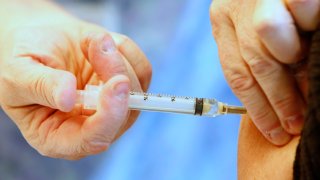
UC San Diego Health announced Wednesday it will join a second, national clinical trial to develop a vaccine designed to protect against SARS-CoV-2, the novel coronavirus that causes COVID-19, by the end of the year.
Like the Moderna clinical trial, which launched in late July, the Phase III national AstraZeneca study will recruit up to 30,000 participants at multiple sites across the country.
The trial arm at UC San Diego will involve an estimated 1,600 participants, with particular outreach intended for underserved communities, and has a scheduled Sept. 8 start date.
UCSD researchers are collaborating with El Centro Regional Medical Center in the Imperial Valley, which has been hard-hit by the pandemic, to create a sub-site of the trial.
"The virus has dealt a devastating blow to both the medical and financial well-being of the region,'' said Dr. Chris Tomaszewski, chief medical officer at ECRMC. "A successful vaccine trial -- our target is more than 1,000 participants -- will give hope as we stop the spread of this disease in such a vulnerable community."
The UCSD trial will utilize a specially equipped bus to bring vaccine testing to communities in San Diego County disproportionately affected by COVID-19 and historically under-represented in medical research. Two other vehicles will serve as mobile clinics for participants who develop COVID-19 during the study.
"The SARS-CoV-2 pandemic has disproportionately impacted communities of color across the United States," said Dr. Susan Little, professor of medicine at UCSD's School of Medicine and principal investigator of the UC San Diego trial.
U.S. & World
News from around the country and around the globe
"These vehicles will help our research team bring vaccine trial opportunities to high-burden communities that might otherwise be underserved."
The trial is sponsored by the National Institutes of Health's COVID-19 Prevention Network and is part of Operation Warp Speed -- a program sponsored by the U.S. Department of Health and Human Services with a goal to deliver 300 million doses of a safe, effective vaccine for COVID-19 by end of year or early 2021.
The latest vaccine candidate is a collaboration between the pharmaceutical giant AstraZeneca and Oxford University, both based in the United Kingdom. It is made from a weakened version of an adenovirus -- which causes the common cold --derived from chimpanzees and modified so it cannot replicate in humans.
Little said the approach is similar to the strategy used safely in previous human vaccine trials for prevention of Middle East Respiratory Syndrome, a coronavirus closely related to COVID-19.
The participants will be recruited and spread across 81 sites. Two-thirds of the participants will receive the test vaccine, given as two injections with the second shot 28 days after the first. The other third will receive two injections of a saline placebo on the same timetable.
Participants must be 18 or older and be in reasonably good health. They must be at increased risk of SARS-CoV-2 infection due to where they live or personal circumstances, such as working as a first responder or in other essential industries such as health care, maintenance, construction, grocery stores or assisted living facilities.
The study is scheduled to last for two years, with seven scheduled study visits to monitor participants' health and well-being. Participants will be asked to monitor for symptoms of COVID-19, such as fever, shortness of breath, cough, headache and loss of sense of taste.
For more information on the clinical trial, click here.



